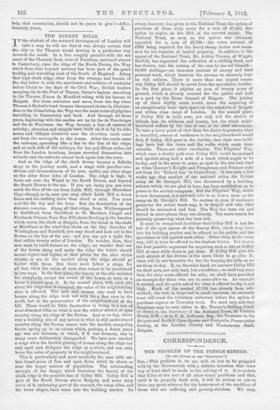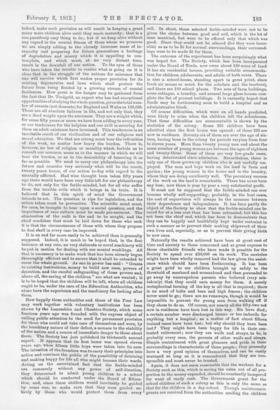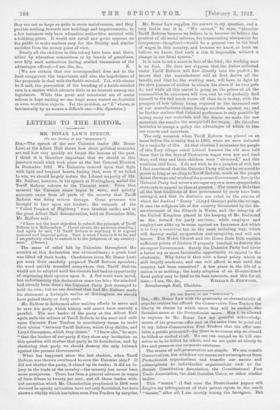CORRESPONDENCE.
THE PROBLEM OF TEE FEEBLE-MINDED. [To rim EDITOR OF see essaceseon.a]
Stn,—This problem is, we are told, at last to be grappled with by the Government with a definite intention that some way at least shall be made in the solving of it. It is certain that it lies at the root of all other social problems and that, until it be properly dealt with, it will be useless to put in force any great schemes for the betterment of the condition of those who are suffering and poverty-stricken. We may,
indeed, make such provision as will result in keeping a great many more children alive until they reach maturity; that is a comparatively easy thing to do ; but if we keep alive without any regard to the mental fitness of those whom we preserve we are simply adding to the already immense mass of in- capacity and preparing for future generations a heritage of degradation and misery which it is appalling to con- template, and which must, at no very distant time, result in the downfall of our nation. To the eyes of those who have taken the trouble to realize what is going on it is clear that in the struggle of the nations for existence that one will survive which first makes proper provision for its existing degenerates and laws which shall protect the future from being flooded by a growing stream of mental feebleness. How great is the danger may be gathered from the fact that Dr. Tredgold, an expert who has had exceptional opportunities of studying the whole question, gives the total num- ber of aments (not dements) for England and Wales as 138,529. These are all absolute failures in life, and not only that, they are a dead weight upon the successes. They are a weight which, for some fifty years or more, we have been adding to every year, as our tenderness for the helpless and our skill in securing for them an adult existence have increased. This tenderness is an inevitable result of our civilization and of our religious and moral education. We that are strong must bear the infirmities of the weak, no matter how heavy the burden. There is, however, no law of religion or morality which forbids us to consult our common sense as to the manner in which we will bear the burden, or as to the desirability of lessening it so far as possible. We need to carry our philanthropy into the future and consider very seriously what will be the result, twenty years hence, of our action to-day with regard to the mentally afflicted. Had wise thought been taken fifty years ago there would have been very little left for our philanthropy to do, not only for the feeble-minded, but for all who suffer from the terrible evils which it brings in its train. It is believed that in this spirit of mind the Government intends to act. The question is ripe for legislation, and the action taken must be preventive. The scientific mind must, for once, be brought to bear upon a social question, and the importance of race culture must be made pre-eminent. The elimination of the unfit is the end to be sought, and the chief condition that must be laid down for those who seek it is that the circumstances of those with whom they propose to deal shall in every case be improved.
It is an end far more easily to be achieved than is generally gupposed. Indeed, it is much to be hoped that, in the first instance at any rate, no very elaborate or novel machinery will be put in motion for dealing with our mental weaklings. All that is necessary is to make work that has been already begun thoroughly efficient and to secure that it shall be extended to cover the whole ground. As one in power has said : " Grants to existing institutions, money to build new ones, powers of detention, and the careful safeguarding of those powers and, above all, the saving of the children" are what are wanted ; it is to be hoped that the children will be left, where all children ought to be, under the care of the Education Authorities, who alone have the experience and the machinery for looking after them.
How happily these authorities and those of the Poor Law may work together with voluntary institutions has been shown by the Lancashire and Oheshire Society, which some fourteen years ago was founded with the express object of calling public attention to the need for permanent provision for those who could not take care of themselves and were, by the hereditary nature of their defect, a menace to the stability of the nation and a source of immediate danger to those about them. The Society has just published its thirteenth annual report. It appears that its first home was opened eleven years ago, when fifteen little boys were taken into its care- The intention of the founders was to carry their principles into action and convince the public of the possibility of detaining and making happy for life all who might become their wards. Acting on the ascertained fact that the feeble-minded are commonly without any power of self-direction, they determined to admit young children to a school -which should be conducted under the Board of Educa- tion, and, since these children would inevitably be guided by some one, to make sure that they were guided en- tirely by those who would protect them from every
evil. In short, these selected feeble-minded were not to be given the choice between good and evil, which is the lot of sane mankind, but were to be offered only that which was good. Since they could not be altered (for they were incur- able) so as to be fit for normal surroundings, their surround- ings were to be made fit for them.
The outcome of the experiment has been surprisingly what was hoped for. The Society, which has been incorporated under the Board of Trade, now owns about 120 acres of land It has six residential houses, providing suitable accommoda- tion for children, adolescents, and adults of both sexes. There is also a school-house, standing apart (a great point, since fresh air means so much for the scholars and the teachers), and there are 180 school places. Two sets of farm buildings, some cottages, a laundry, and several large glass-houses com- plete the list of present buildings. It is earnestly hoped that funds may be forthcoming soon to build a hospital and an administrative block.
Of course difficulties, which were on all hands predicted, were likely to arise when the children left the schoolroom. That these difficulties are surmountable is shown by the statistics of the colony. Some 285 children have been admitted since the first house was opened : of these 233 are now in residence. Seventy-six of them are over the age of six- teen, having been in the colony for periods varying from four to eleven years. More than twenty young men and about the same number of young women are between the ages of eighteen and twenty-three. Some of them are very low-grade eases, having deteriorated since admission. Nevertheless, there is only one of these grown-up children who is not usefully em- ployed. The men and boys work on the land in farm and garden ; the young women in the house and in the laundry, where they are doing excellently well. The pecuniary success of the work on the land is remarkable. There has never been any loss ; now there is year by year a very substantial profit.
It must not be supposed that the feeble-minded can ever become wholly self-supporting; probably, in the best cages, the cost of supervision will always be the measure between their dependence and independence. It has been partly the object of the Society to show that the feeble-minded can be cared for at a less cost than has been estimated, but this has not been the chief end, which has been to demonstrate that they can be happily and healthfully kept under restraint in such a manner as to prevent their making shipwreck of their own lives and, especially, so as to prevent their giving birth to new ones.
Naturally the results achieved have been at great cost of time and anxiety to those concerned and at great expense to those charitable friends who have made it possible for the Society to spend over £30,000 on its work. The anxieties might have been wholly removed had the law given the wedge ance which should have been forthcoming. It has been a great grief to see children brought up safely to the threshold of manhood and womanhood and then persuaded to go away by unscrupulous parents who believed (very mis- takenly) that they could earn money for them. A merely metaphorical turning of the key is all that is required ;. there is no need of bolts and bare and high fences; the children never want to go; there are no runaways, though it would be impossible to prevent the young men from walking off if they chose to do so. Of course, not nearly all the fifty-two not now in residence have been lost in this way. Six have died; a certain number were discharged insane or too imbecile for anything but a hospital; as a matter of fact about fifteen trained oases have been lost; but why should they have been lost P They might have been happy for life in their con- tented retirement; now they are waifs and strays, to be, in probably every case, the parents of other waifs and strays. Simple contentment with great pleasure and pride in their surroundings is characteristic of these people ; they generally have a very good opinion of themselves, and can be easily managed so long as it is remembered that they are irre- sponsible and must never bo trusted. Again, it does not seem reasonable that the workers for a Society such as this, which is saving the rates out of all pro- portion to the money expended, should be constantly hampered for want of ready cash. The Government grant for the school children of such a colony as this is only the same as that for the children in a day-school. Though maintenance grants are received from the authorities sending the children
they are not so large as quite to cover maintenance, and they provide nothing towards new buildings and improvements; in a few instances only have education authorities assisted with a building grant. It would not entail any great expense on the public to make matters easy for the Society and similar societies from the money point of view.
Nearly all the children in this colony have been sent there, either by education committees or by boards of guardians, over fifty such authorities having availed themselves of the
advantages offered.—I am, Sir, &c., Z.
[We are certain that our correspondent does not in the least exaggerate the importance and also the hopefulness of the proposals to deal with the feeble-minded. Yet, with shame be it said, the prevention of the breeding of a feeble-minded race is a matter which attracts little or no interest among our legislators. While this great and beneficent act of social reform is kept waiting we see huge sums wasted on doubtful or even worthless objects. Yet the problem, as " Z " shows, is intrinsically by no means a difficult one.—ED. Spectator.]












































 Previous page
Previous page